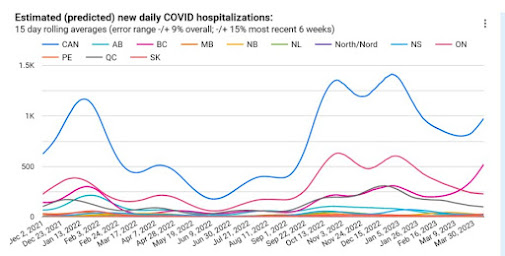I'm waiting to write my last exam of the term. It's supposed to open at 8:00, and we have 90 minutes to write it, online, multiple choice, open book. I set aside 8-9:30 am today to write, and asked my kids to stay in their rooms until I finished. Except it's not up yet. I checked the date and time repeatedly, then I emailed the prof. No answer. I really hope she's okay! I'm not too worried, though, because this kind of thing has been happening all term. I've taken it upon myself to be the unsolicited student secretary for my profs, opening myself to potential thanks or subtle retaliation for being that person that's annoyingly on the ball, as if I'm showing them up when really I just want to get through these courses!! I've chalked many of the problems up to poor tech training on the online platform they're made to use. But...
While waiting, I went down a rabbit's hole of brain studies and random analysis.
Biorisk consultant Conor Browne, explained that he forecasts pandemic effects as part of his job and how tricky it is when so few are in the Covid control group anymore - i.e. never-infected. So instead he looks to societal trends, which is a complicated thing to weed out. But he points to a new problem at live musicals where fans are loudly singing along to the songs and bringing in full meals of take out food, then getting into fights when asked to sit quietly and put away the food. [ETA: Another article described people leaving feces in the aisles of theaters and throwing things at musicians, and blames the lockdowns that happened for a few months over three years ago.] This isn't Rocky Horror Picture Show we're talking about here; it's My Bodyguard and other dramatic pieces. I'm a huge fan of musical theatre and have been to dozens of shows with a wide variety of audiences and have never heard someone in the audience sing along or seen anyone eat more than the tiny overpriced box of chocolate almonds you can get at intermission. But here we are. The description reminded me a lot of some of my students in my final months of teaching. Browne's conclusion:
"Let me offer a tentative alternative hypothesis, as opposed to the dubious idea of people forgetting how to behave in public during a relatively short period of time.
Aggression and disinhibition are signs of mild cognitive impairment."
Two studies are getting their ten minutes of social media fame today despite being originally published in January and February respectively:
One, published in Journal of Alzheimer's Disease Reports, looked at the effect of Covid on people with preexisting dementia and found that in all cases, even for cases in which cognitive ability was stable and manageable, Covid caused a sudden rapid decrease in cognitive ability. It accelerated the dementia, and brain imaging show a lot more "white matter" in the brain.
Quick brain lesson/reminder: Our brain is about 10% neurons (grey matter) and 90% glial cells (white matter). More or less, the neurons make everything in the brain and body work by passing messages around to tell body parts what to do. The glial cells are structural and vitally important, so we do use 100% of our brain even though only 10% will ever be neurons. Good structure and insulation of axons means clear transmission of messages. But inflammation in the brain causes the glial cells to swell and the signals don't get sent as quickly or to the right places in the right ways, if at all.
The lead author of the study, Dr. Souvik Dubey, suggests we stop using the term "brain fog" to describe Covid's effect on the brain, and instead call it "FADE-IN MEMORY," which is an acronym for Fatigue/Fluency issues, Attention deficit, Depression, Executive dysfunction, INformation processing speed disorders, and MEMORY impairment.
Here are all the things that are part of executive functioning, an important part of the tasks of the prefrontal cortex that differentiate humans from most other mammals, which is being affected by Covid:




No comments:
Post a Comment